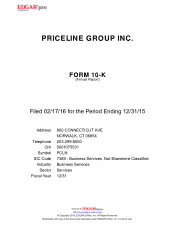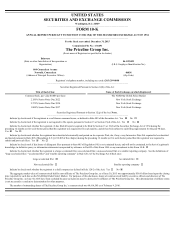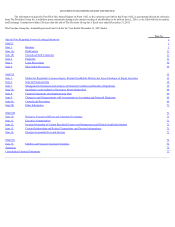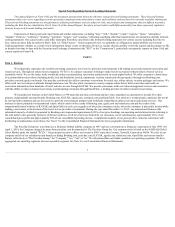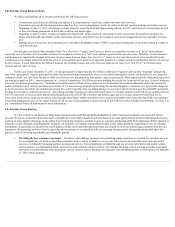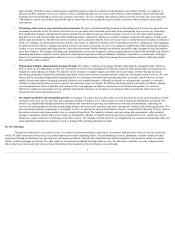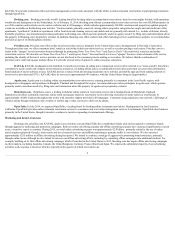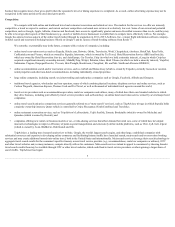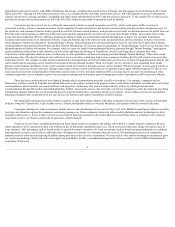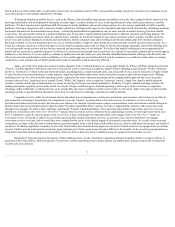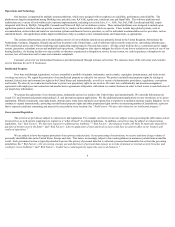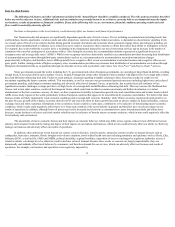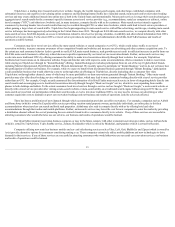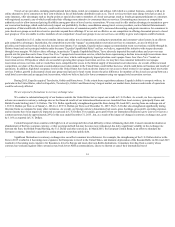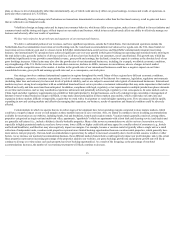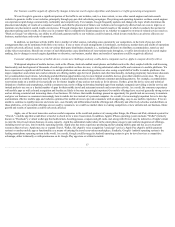Priceline 2015 Annual Report Download - page 10
Download and view the complete annual report
Please find page 10 of the 2015 Priceline annual report below. You can navigate through the pages in the report by either clicking on the pages listed below, or by using the keyword search tool below to find specific information within the annual report.
Hotels & Resorts in November 2015, could result in lower rates of commission paid to OTCs, increased discounting, and greater incentives for consumers to join
closed user groups as such groups expand their offerings.
Widespread adoption of mobile devices, such as the iPhone, Android-enabled smart phones and tablets such as the iPad, coupled with the improved web
browsing functionality and development of thousands of useful "apps" available on these devices, is driving substantial online traffic and commerce to mobile
platforms. We have experienced a significant shift of business to mobile platforms and our advertising partners are also seeing a rapid shift of traffic to mobile
platforms. Our major competitors and certain new market entrants are offering mobile apps for travel products and other mobile functionality, including proprietary
last-minute discounts for accommodation reservations. Advertising and distribution opportunities may be more limited on mobile devices given their smaller
screen sizes. The gross profit earned on a mobile transaction may be less than a typical desktop transaction due to different consumer purchasing patterns. For
example, accommodation reservations made on a mobile device typically are for shorter lengths of stay and are not made as far in advance. Further, given the
device sizes and technical limitations of tablets and smart phones, mobile consumers may not be willing to download multiple apps from multiple companies
providing a similar service and instead prefer to use one or a limited number of apps for their mobile travel and restaurant research and reservation activity. As a
result, the consumer experience with mobile apps as well as brand recognition and loyalty are likely to become increasingly important. Our mobile offerings have
received generally strong reviews and are driving a material and increasing share of our business. We believe that mobile bookings present an opportunity for
growth and are necessary to maintain and grow our business as consumers increasingly turn to mobile devices instead of a personal computer and to mobile apps in
addition to a web browser. If we are unable to continue to rapidly innovate and create new, user-friendly and differentiated mobile offerings and efficiently and
effectively advertise and distribute on these platforms, or if our mobile apps are not downloaded and used by consumers, we could lose market share to existing
competitors or new entrants and our future growth and results of operations could be adversely affected.
Apple, one of the most innovative and successful companies in the world and producer of, among other things, the iPhone and iPad, obtained a patent for
"iTravel," a mobile app that would allow a traveler to check in for a travel reservation. In addition, Apple's iPhone operating system includes "Wallet" (formerly
known as "Passbook"), a virtual wallet app that holds tickets, boarding passes, coupons and gift cards, and, along with iTravel, may be indicative of Apple's intent
to enter the travel reservations business in some capacity. Apple has substantial market share in the smart phone category and controls integration of offerings,
including travel services, into its mobile operating system. Apple also has more experience producing and developing mobile apps and has access to greater
resources than we have. Apple may use or expand iTravel, Wallet, Siri (Apple's voice recognition "concierge" service), Apple Pay (Apple's mobile payment
system) or another mobile app or functionality as a means of entering the travel reservations marketplace. Similarly, Google's Android operating system is the
leading smart phone operating system in the world. As a result, Google could leverage its Android operating system to give its travel services a competitive
advantage, either technically or with prominence on its Google Play app store or within its mobile search results. To the extent Apple or Google use their mobile
operating systems or app distribution channels to favor their own travel service offerings, our business could be harmed.
Competition in U.S. online travel remains intense and online travel companies are creating new promotions and consumer value features in an effort to
gain competitive advantages. In particular, the competition to provide "opaque" accommodation reservation services to consumers, an area in which our
priceline.com business has been a leader, has become more intense. For example, Expedia makes opaque accommodation room reservations available through its
Hotwire brand and on its principal website under the name "Expedia Unpublished Rates" and has, we believe, supported this initiative with steeper discounts
through lower margins. We believe these offerings, in particular "Expedia Unpublished Rates," have adversely impacted the market share and year-over-year
growth rate of priceline.com's Name Your Own Price ® opaque hotel reservation service, which has been experiencing a decline in room night reservations since
2011. Competitors could also launch opaque rental car services, which could negatively impact priceline.com's opaque Name Your Own Price ® rental car
reservation service. If Expedia or others are successful in growing their opaque reservation services, we may have less consumer demand for our opaque
reservation services over time, and we would face more competition for access to the limited supply of discounted reservation rates. As a result of this increased
competition, our share of the discount accommodation reservation market in the United States could further decrease, which could harm our business and results of
operations. In addition, high hotel occupancy levels in the United States have had an adverse impact on our access to hotel rooms for our opaque hotel reservation
services. Further, growth in discounted closed user group retail prices for hotel rooms lessens the price difference for members of the closed user group between a
retail hotel reservation and an opaque hotel reservation, which we believe has led to fewer consumers using our opaque hotel reservation services.
During 2015, Expedia acquired Travelocity, Orbitz and HomeAway. To the extent these acquisitions enhance Expedia's ability to compete with us, in
particular in the United States, which is Expedia's, Travelocity's, Orbitz's and HomeAway's largest market, our market share, business and results of operations
could be adversely affected.
7

